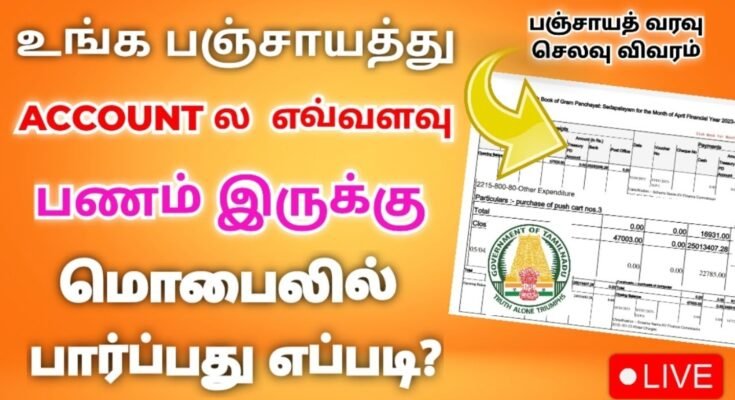Grama Panchayat funds Check online
How to Check Grama Panchayat funds online The grama Panchayat platform, a digital governance initiative by the Ministry of Panchayati Raj, Government of India, seeks to enhance transparency, accountability, and public involvement within rural panchayats, including those in Tamil Nadu.
Key features include:
The Meri Panchayat App offers details on panchayat representatives, committee structures, Gram Sabha meeting agendas, panchayat budgets, fund statuses, ongoing and pending development projects, and beneficiaries of welfare schemes.
Users are enabled to propose new projects, contribute suggestions for the Gram Panchayat Development Plan, monitor complaints (with geo-tagged photos), and assess the quality of development initiatives.
The platform integrates with national portals like eGram Swaraj and MGNREGA, with the goal of providing rural residents with convenient access to governance information and services.
While the app is available in multiple languages, some users in states such as Tamil Nadu have noted that the availability of local language support (Tamil) within the app interface may not always be consistent.
In addition to the information provided, you may also find relevant details regarding panchayats specific to Tamil Nadu on the official website of the Rural Development & Panchayat Raj Department of Tamil Nadu, which offers state-level regulations, reports, and contact information. Furthermore, the Directorate of Town Panchayats oversees urban panchayats within Tamil Nadu.
The Meri Panchayat platform is intended for use throughout India, including Tamil Nadu, although the availability of local data and language support might differ.
The implementation of the Meri Panchayat platform in Tamil Nadu is a component of a broader national endeavor to digitize local self-governance through the e-Panchayat Mission Mode Project, which incorporates applications such as Meri Panchayat and eGramSwaraj.
The rural panchayats of Tamil Nadu are actively involved in these digital governance initiatives, with the objective of improving transparency, encouraging citizen participation, and ensuring efficient service delivery.
Key elements of the implementation in Tamil Nadu include:
Scope and Funding: From the fiscal year 2022–23, Tamil Nadu has been allocated ₹107.37 crore for these initiatives (RGSA and digital Panchayat platforms), with ₹98.17 crore being utilized for capacity building, infrastructure development, and the provision of digital tools at the panchayat level.
Application Features: The Meri Panchayat application is accessible to residents, providing them with access to information regarding local representatives, Gram Sabha meetings, development projects, budgets, and the ability to offer feedback and submit complaints accompanied by geo-tagged photographs, thereby enabling local citizens to engage directly in governance.
Digital Platforms: In Tamil Nadu, panchayats are diligently preparing, uploading, and publicly displaying Gram Panchayat Development Plans (GPDPs) online through eGramSwaraj. Financial transactions related to central grants are managed digitally, allowing for real-time tracking of development projects, budgets, and asset management.
Training & Capacity Building: Furthermore, financial resources have been allocated to facilitate comprehensive training initiatives for elected officials and staff, enabling them to effectively utilize these digital tools and enhance local governance.
Transparency & Accountability: Platforms such as eGramSwaraj and AuditOnline are instrumental in monitoring projects, budgets, and auditing panchayat accounts, thereby improving public access to planning and progress through open platforms and citizen charters.
State Platforms: The Rural Development & Panchayat Raj Department and the Directorate of Town Panchayats provide additional Tamil Nadu-specific information, regulations, and support for urban areas.
Some residents may find the local language interface (Tamil) in the Meri Panchayat app to be inconsistent, potentially impacting its user-friendliness.
Currently available sources do not provide comprehensive district-wise data regarding adoption and performance.
State Government Devolution and Assigned Revenues: The Tamil Nadu government allocates a portion of its revenues, including local cess, stamp duty surcharges, entertainment tax, and pooled assigned revenues, directly to rural local bodies. Within the devolution grant, 60% is directed to village panchayats, with specific provisions for infrastructure gap funding and equalization grants.
Own Source Revenue: Panchayats have the authority to collect their own taxes, fees, and tariffs, such as property tax, water charges, and user fees, although this avenue remains relatively underutilized in the majority of Gram Panchayats.
Central and State Schemes: Funds designated for particular rural development initiatives, such as MGNREGA and PMAY, are channeled through panchayats, thereby facilitating projects related to water, roads, health, sanitation, and welfare.
External and Multilateral Aid: Financial assistance in the form of loans and grants from organizations like the World Bank, Asian Development Bank (ADB), German Development Bank (KfW), and Japan International Cooperation Agency (JICA) contributes to infrastructure and development programs, particularly within urban and peri-urban panchayat regions.
Special Purpose Grants: Specific grants, including the Infrastructure Gap Filling Fund and Project Sustainability Grant Fund, are allocated to address specific requirements, encompassing capital projects and the financial sustainability of panchayat-level initiatives.
These financial resources are further supported by stipulations for transparency, such as utilization certificates, public planning, and monitoring, with eligibility often contingent upon local performance metrics like revenue collection and the uploading of digital plans.
